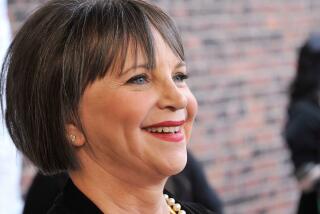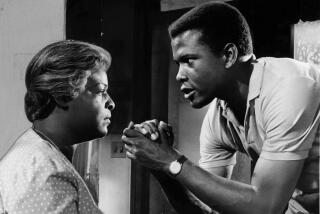‘Other’ Ray Charles dies at 96; Emmy-winning composer backed Perry Como
Ray Charles, an Emmy-winning choral director, lyricist and composer who worked with Perry Como for three decades, sang the theme song for the television sitcom “Three’s Company” and didn’t mind being known as “the other Ray Charles,” died Monday at his Beverly Hills home. He was 96.
His death was confirmed by his son, Michael, who said his father had cancer.
During a career that spanned radio, television, films and records, Charles was known for his ability to create melodies and meld voices in an intimate, easy-listening style that was well-suited to TV musical revues of the 1950s, ‘60s and ‘70s. He arranged and composed music for such shows as “Your Hit Parade,” “Sha-Na-Na,” The Glen Campbell Goodtime Hour” and “The Muppet Show,” and worked with Sid Caesar, Bing Crosby, Ella Fitzgerald, Julie Andrews, Tony Bennett and other stars.
Known as an authority on American popular music, Charles also was a consultant for the annual “The Kennedy Center Honors” for 31 years.
He was best known for his long association with Como, the smooth baritone who hosted a popular variety show on NBC in the 1950s and ‘60s. Charles and his singers not only backed Como on the show and 31 albums but accompanied him on tour. It was Como who introduced the group on the program as the Ray Charles Singers, and the name stuck.
The Ray Charles Singers recorded more than 30 of their own albums for the Essex, MGM, Decca and Command labels. It made the top 100 about a dozen times between 1955 and 1970 with such hits as “Love Me With All Your Heart” and “Al-Di-La.”
Charles’ choral style raised hackles in the studio when he began recording in the 1950s. The sound engineer told him that the group’s soft, whispering tones would be obliterated by surface noise on the record. “I told them that was their problem,” Charles said in Joseph Lanza’s book “Elevator Music: A Surreal History of Muzak, Easy-Listening, and Other Moodsong” (2004).
“My whole theory of singing,” he said in the book, “is that you were singing to someone no more than two feet away, like a lover.”
His name often caused confusion despite obvious differences from the black, blind soul singer.
One time during the Reagan Administration the white Charles was invited to join the line of Kennedy Center Honors guests allowed to meet the president. When Reagan was handed a card with Charles’ name on it, he did a double-take and quipped, “I didn’t know you came in two colors.”
(In a 1986 Muppets special, which featured the black Charles in archival footage, the music credits make a teasing reference to the identity confusion, calling the choral director-composer “The Other Ray Charles.”)
Charles met the other Ray on a TV assignment and persuaded him to sing “America the Beautiful” on the Campbell show, more than a decade before the soul icon’s stirring rendition of the song at the 1984 Republican National Convention.
Born Charles Raymond Offenberg in Chicago on Sept. 13, 1918, Charles won a radio singing contest at 13 and had his own 15-minute program by 16. He went on to study at Chicago Musical College and Central YMCA College.
He moved to New York in 1942 and began working in radio. Although he had been calling himself Ray Charles (an inversion of the name of a famous silent movie idol, Charles Ray) since high school, he did not legally change his name until 1944, his son said.
During his stint on the Perry Como show, which aired from 1949 to 1963, he was asked to set the names of all 50 states to music. The result was “Fifty Nifty United States,” which has been memorized by several generations of schoolchildren. (A number of online sources provide the lyrics along with an image of the wrong Ray Charles.)
He also led the Ray Charles Singers in many TV commercials for products including Lipton tea, Lucky Strike and Chesterfield cigarettes, and Cover Girl cosmetics.
He won Emmys for music and lyrics for two shows in 1971, “The First Nine Months Are the Hardest” and “The Funny Side.”
He wound up singing the “Three’s Company” theme song (with Julia Rinker Miller) by accident.
He was asked to teach the tune (“Come and knock on our door. We’ve been waiting for you ...”) to the show’s stars — John Ritter, Suzanne Somers and Joyce DeWitt — but their efforts after an hour’s practice were not promising.
Asked by the producers how the trio was doing, Charles was tactful. “I said, ‘I’m not sure,’” he recalled in 2008. “They said, ‘Well, we are. We like the way you sing it.’ And that’s how I got it.”
Charles’ wife, Bernice, died in 2002, and a daughter, Wendy, died in 2004. Besides his son Michael, he is survived by son Jonathan and four grandchildren.
Twitter: @ewooLATimes
More to Read
Start your day right
Sign up for Essential California for the L.A. Times biggest news, features and recommendations in your inbox six days a week.
You may occasionally receive promotional content from the Los Angeles Times.







